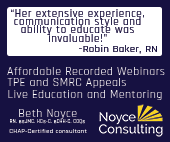by Lynn Labarta, SimiTree
Reduce Insurance Claim Denials
2025 Guide for Home Health and Hospice Agencies
Is your home health or hospice agency struggling with insurance claim denials? You’re in good company. As we move into 2025, claim denials remain the #1 challenge affecting revenue cycles across the industry. But there’s hope – we’ve compiled the latest strategies and insights to help you overcome this persistent challenge.
The Current State of Home Health & Hospice Billing
The healthcare landscape continues to evolve, and with it, so do the complexities of billing and reimbursement. Home health and hospice agencies face unique challenges, from managing PDGM requirements on the home health side to navigating multiple payer systems on the hospice side. Recent data shows that denied claims significantly impact not just revenue but also patient care delivery and operational efficiency.

Understanding Home Health & Hospice-Specific Denial Triggers
Let’s examine the primary causes of claim denials in our sector:
Home Health Eligibility Challenges
- Medicare homebound status verification issues
- Face-to-face documentation gaps
- PDGM period confusion
- Medicare Advantage plan authorization complexities
Hospice-Specific Documentation Issues
- Terminal illness certification problems
- Level of care documentation gaps
- Missing physician narratives
- Notice of Election timing issues
Strategic Solutions to Reduce Insurance Claim Denials in 2025
Optimize Your Intake Process
- Implement robust homebound status verification- Home health
- Establish face-to-face documentation protocols
- Create PDGM period tracking systems- Home health
- Develop payer-specific authorization workflows
Leverage Technology Effectively
- Use specialized home health & hospice billing software
- Implement automated eligibility verification systems
- Set up PDGM period alerts- Home health
- Utilize NOE and NOA tracking tools
Build a Specialized Denial Management Approach
- Create dedicated teams for Medicare vs. non-Medicare appeals
- Develop PDGM-specific denial protocols- Home Health
- Establish hospice-specific documentation review processes
- Implement specialty-focused staff training programs
Pro Tips for Implementation
- Focus on specialty-specific staff training in home health and hospice billing requirements
- Create separate workflows for different payer types (Medicare, Medicare Advantage (home health), private insurance)
- Implement weekly PDGM period reviews- Home Health
- Establish clear communication channels between clinical and billing staff
Looking Ahead in 2025
The home health and hospice landscape continues to evolve, but with proper strategies in place, your agency can thrive. Focus on building robust processes that address the unique challenges of our industry while maintaining compliance and optimization.
Action Steps to Reduce Insurance Claim Denials for Your Agency
- Evaluate your current denial rates by payer type
- Assess your PDGM period management effectiveness- Home Health
- Review your hospice documentation protocols
- Implement targeted improvements based on your findings
Remember, reducing claim denials isn’t just about better processes – it’s about ensuring your agency’s financial health so you can continue providing essential care to your community.
# # #


Lynn Labarta, VP of Post Acute RCM and the founder of Imark Billing (now SimiTree) has a wealth of experience in the healthcare industry. Lynn provides comprehensive billing services for home health and hospice agencies, streamlining their revenue cycle management process while supporting and managing billing challenges and compliance with evolving healthcare regulations and managing billing challenges; essentially acting as a key partner to ensure accurate and timely claim submissions and optimal revenue collection for agencies.
©2024 by The Rowan Report, Peoria, AZ. All rights reserved. This article originally appeared in Healthcare at Home: The Rowan Report. One copy may be printed for personal use: further reproduction by permission only. editor@therowanreport.com



